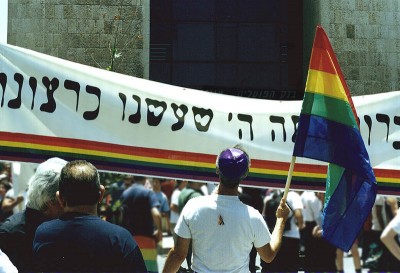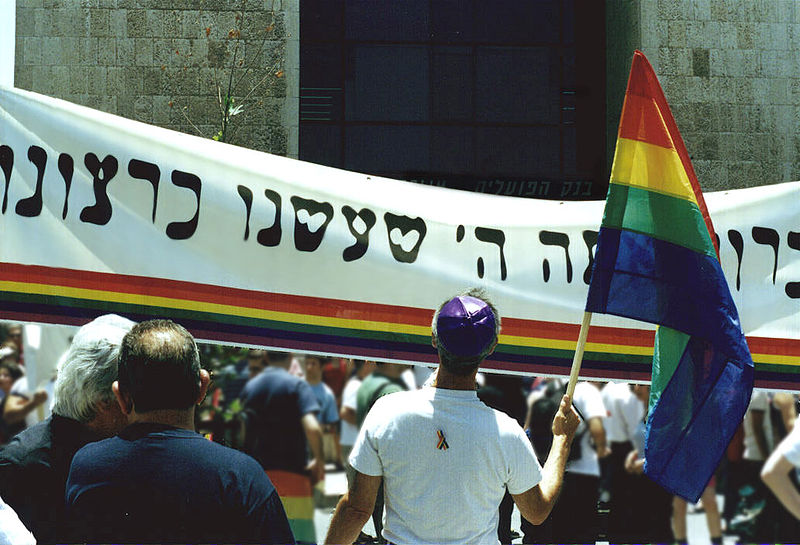
The Shabbat of Parashat Akharei Mot-Kedoshim— the Torah portion that was read in many synagogues this past Saturday morning — is always a painful one for me and many other queer Jews. The verses it contains concerning the prohibition of male homosexuality have long been used as justification for excluding queer people from religious life.
This past week, the United States Supreme Court heard oral arguments for Obergefell v. Hodges, a case which could determine that marriage equality for queer couples is a constitutional right, thereby extending marriage equality to all 50 states. And although marriage equality will not magically erase the systemic inequality that LGBTQ people face in the United States, it has furthered the cause of LGBTQ rights, allowing it to enter the public American consciousness and conversation like never before. The conjunction of these two events made for a fairly bittersweet week.
Yet, so much of the argument against marriage equality is about religious freedom and values, while the arguments in favor of it usually focus on the fact that there are important values other than freedom of religion. It is not very common for marriage equality and LGBTQ rights to be championed as a distinctly religious value, and this is no less true in the Orthodox world where the conversation about LGBTQ inclusion is only now just coming to the fore.
To be sure, Orthodox rabbis even — or perhaps especially — including those who are usually outside of the mainstream Orthodox tent, like Rabbi Shmuly Yanklowitz, have written about the Jewish values of inclusion, but very little has been done to actually take positive action towards reducing the systematic prejudice faced by LGBTQ people in Orthodox spaces.
We don’t just need to talk and share our stories. Nor do we, as queer people, need to actively seek straight people’s sympathy. Endlessly repeating my sob stories about all of the times I have felt uncomfortable in Orthodox spaces ignores the fact that from the start, I knew full well that I was in a space designed without any thought for queer people and a promise that it gets better.
And yet these narratives of pain, anguish, and ultimately leaving Orthodoxy are all we have, because Orthodox Judaism has yet to take the next step and demand that we move beyond narratives of pain and anguish. I don’t want to have to broadcast my suffering and anguish over biblical verses— and to be sure, hearing those verses read on Shabbat, even in a community where I am completely accepted as a queer person, still causes anguish and brings back many memories of when that wasn’t the case — to gain a pat on the back and a seat in the synagogue, to be affirmed in my identity as a lip service to a promise for the inclusion of queer people.
Merely admitting that suffering and pain exist adds up to comparatively little. We don’t just need our religious leaders and role models to state that they are allies; we need substantive action from the positions of power that they hold. A simple of admission that other people feel pain is not an expression of religious values. Instead, we need direct action toward ensuring that these religious values are seen through and that LGBTQ inclusion in full comes to the synagogue and into Jewish communal life. Then, and only then, can we even begin to call Orthodoxy LGBTQ-inclusive.
Such direct action means publicly endorsing a marriage or commitment ceremony for queer couples, as opposed to asking them to find other rabbis to perform those ceremonies (if they can have one at all) then coming to join the celebration once the ceremony has been conducted elsewhere. It means having serious conversations — and coming to serious conclusions — about how those who lie outside the gender binary can function in a setting which is so overtly and rigidly gendered, including how transgender people can be effectively included in those spaces. It means enacting policies to address the question of which names to use when the child of a queer couple is called for an aliyah. It means not only addressing the anguish, but actively working to prevent it by creating systems allowing for the genuine and full inclusion of LGBTQ people in Orthodox ritual— and not just communal—life.
It ultimately means answering the question: What are we LGBTQ Jews supposed to do with our stories, our pain, and our anguish? Are we doomed to continue feeling that we are not going to be treated as full equals every time we step into a synagogue?
If we want to make our spaces fully and genuinely LGBTQ inclusive, the answer should be an emphatic no. I acknowledge that encouragement to remain in Orthodox communities can and should only go so far, but under the status quo, we continue to implicitly (or even explicitly) send the message that queer people cannot, and will never be, full equals. We continue to pigeon-hole LGBTQ people to two verse in the Bible that reduce our identities to our sexual preferences and ignore the fact that we are actually far more complex people.
It’s one thing to say that LGBTQ inclusion is a Jewish value. It’s quite another to take these deeply held religious values and put them into action. What better time to begin acting on our values than while the two verses that have caused us so much trouble are still ringing in our ears.
Amram Altzman is a student at List College.

